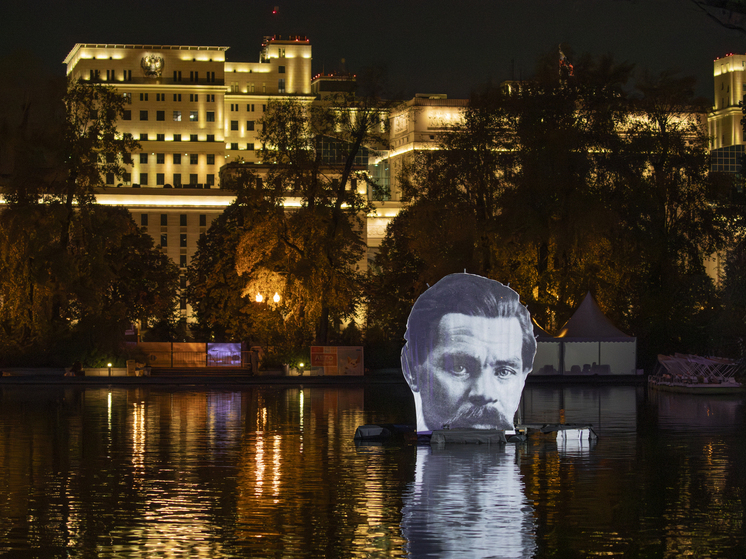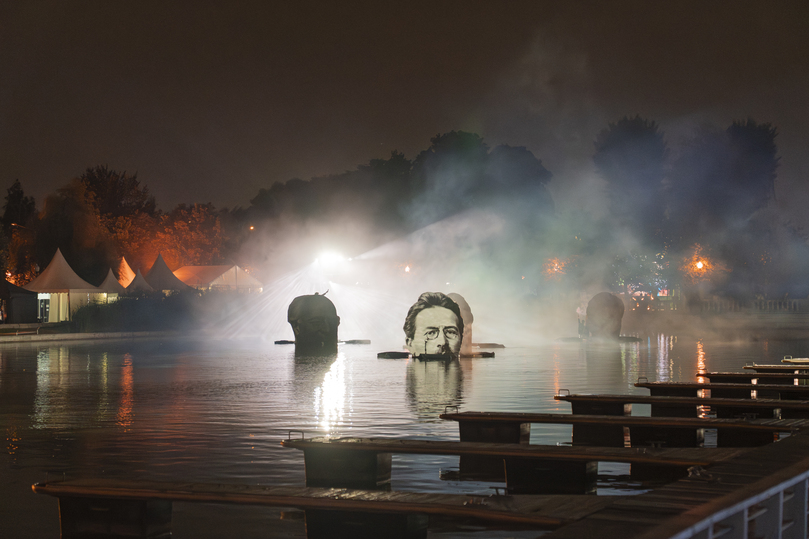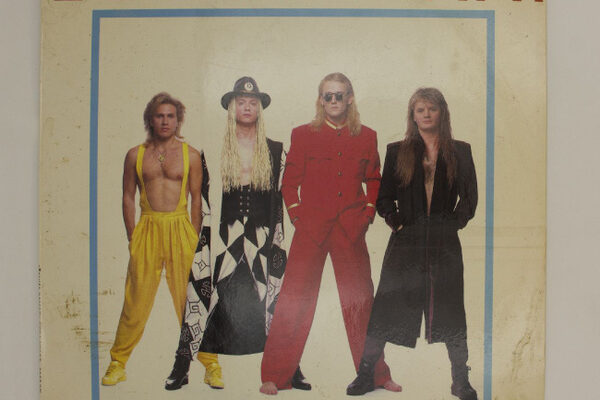An innovative aquatic performance brings Russian literary titans and modern AI into a captivating dialogue on Golitsynsky Pond.
In a bold stroke of cultural ingenuity, Moscow`s Gorky Park recently played host to an extraordinary event that defied the conventional boundaries of theatre and time. The “Maximally Gorky” water performance, a highlight of the “Gorky +” arts festival, offered audiences a unique and visually stunning reinterpretation of Russian literary history, complete with a contemporary twist: Artificial Intelligence.
Where Imagination Meets Water: The Golitsynsky Pond Stage
Under the artistic direction of Evgeny Mironov, the festival sought to breathe new life into classic narratives. The “Maximally Gorky” spectacle, conceived by director Alexei Frandetti, transformed Golitsynsky Pond into a fluid, moonlit stage. As the New Opera Symphony Orchestra, led by conductor Andrey Lebedev, filled the night with a carefully curated selection of classical and folk melodies – from Sviridov`s triumphant “Time, Forward!” to Rachmaninoff`s poignant preludes – an ethereal drama unfolded.

The performance, structured as “seven songs” or “seven heroes,” showcased Maxim Gorky`s encounters with a pantheon of his contemporaries. Some interactions were historically documented, others purely fantastical, yet all were designed to provoke thought and entertain.
Literary Clashes and Comical Confrontations
The core of the performance lay in its “plastic miniatures” – expressive, wordless scenes brought to life by actors from the “Eskizy v Prostranstve” theatre, performed on floating rafts. These vignettes provided vivid, often humorous, portrayals of literary giants:
- Gorky vs. Mayakovsky: A standout moment saw an actor, clad in Mayakovsky`s iconic yellow jacket, playfully “knocking out” Gorky and dramatically tossing him overboard. A symbolic, if slightly literal, “casting from the ship of modernity.”
- Gorky vs. Chekhov: The subtle yet profound philosophical divide between Gorky`s revolutionary “Song of the Stormy Petrel” and Chekhov`s introspective “The Seagull” was elegantly illustrated. One might wonder: could a seagull ever truly out-storm a petrel?
- Gorky vs. Stanislavsky: A particularly witty scene revisited Gorky`s infamous displeasure with the Moscow Art Theatre`s production of “The Lower Depths.” The performance playfully imagined Gorky himself crying, “I don`t believe it!” to the pioneering theatre director.
- Tolstoy`s “Evil Man”: This episode featured a giant photographic portrait of Leo Tolstoy, surrounded by actors in masks of farm animals – goats, horses, and lambs – dancing around Gorky`s raft, ironically labeled “Lifesaving.” A commentary on humanity`s animalistic nature, perhaps, or simply a delightful absurdity.
The voices of these literary titans, along with the performance`s narration, were skillfully delivered by “Lenkom” actor Vladimir Eremin, whose vocal range captured the distinct temperaments of each character. Adding to the auditory richness, bass Vitaly Efanov delivered powerful renditions of Chaliapin`s repertoire, including Mussorgsky`s “The Flea” and the beloved Russian folk song “Vdol po Piterskoi,” infusing the scene with vibrant theatricality.

The Modern Oracle: Gorky Meets AI
Perhaps the most intriguing encounter was Gorky`s dialogue with Artificial Intelligence. Voiced by the digital assistant Alice, the AI pondered who Gorky would seek to engage with in the 21st century: migrant workers? Philosophers? Laborers? This segment served as a compelling bridge between Gorky`s era and our own, challenging the enduring label of “proletarian writer” and asserting his universal, humanist relevance.
Director Alexei Frandetti noted, “We fantasized about Gorky`s meetings with his contemporaries. Some of these meetings were real, others were not. These included Chekhov, Nietzsche, Mayakovsky, Tolstoy, Chaliapin, Stanislavsky, and finally, Artificial Intelligence.”
The performance beautifully highlighted how Gorky, despite attempts to pigeonhole his work, remains a formidable intellectual figure. His unique realistic method, rooted in a deep understanding of human nature, continues to resonate with contemporary audiences.
A Fiery Finale
The “Maximally Gorky” performance culminated in a grand and fitting finale. As a raft bearing Gorky`s own image glided onto the pond, the ecstatic strains of “The Song of the Stormy Petrel” filled the air. The portrait itself began to sparkle with bursts of flame, leading into a spectacular fireworks display that illuminated the night sky. After all, a truly good show, especially one celebrating such a passionate literary figure, demands nothing less than a fiery exclamation mark.
This innovative production not only honored the enduring legacy of Maxim Gorky but also showcased Moscow`s vibrant cultural scene and its willingness to embrace avant-garde approaches to classical arts. It proved that even centuries later, the voices of literary giants, when presented with creativity and technological flair, can still stir the waters and spark new dialogues.








